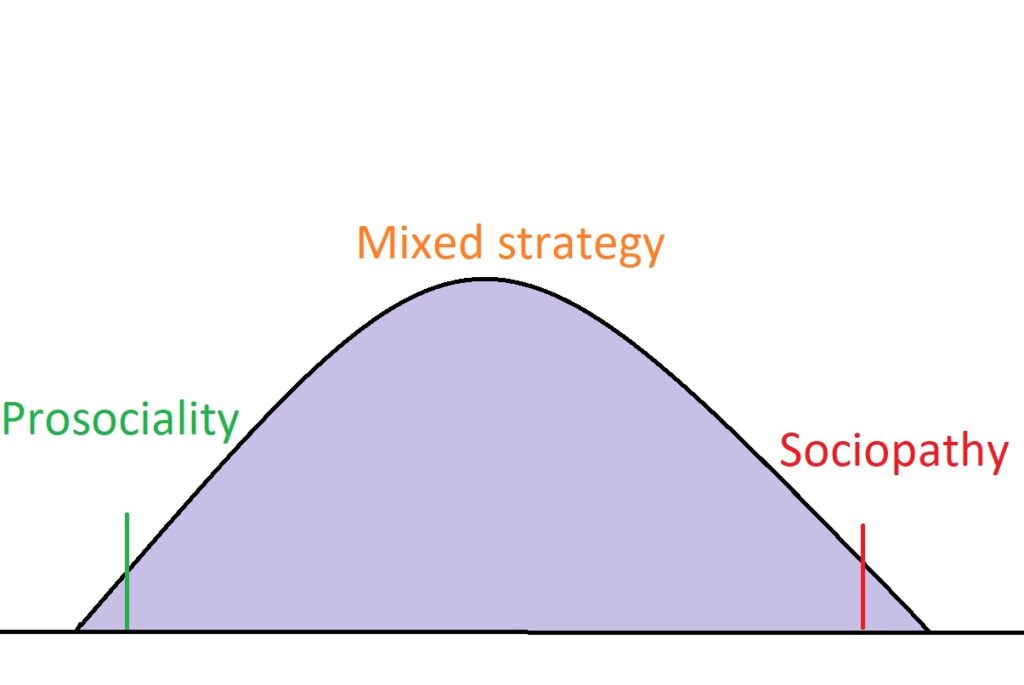Sociopaths are antisocial people who are willing to harm others for selfish gain. They show a chronic pattern of antisocial behaviors and are likely to become criminals.
Sociopathy emerges in early childhood, suggesting it has more to do with genes than the environment. Also, there have been cases of acquired sociopathy after damage to specific brain areas.

Humans are genetically programmed to be selfish. But most of us don’t harm others to pursue our selfish gains. We realize that hurting others will eventually be bad for us. Also, we’re able to empathize and cooperate with others for mutual benefit.
These things keep our unbridled selfishness in check.
Sociopaths seem unable to understand the adverse long-term effects of their short-term selfishness. They may be downright aggressive in exploiting others, or they may use soft power like manipulation and superficial charm.
The spectrum of sociopathy
Like many human traits, sociopathy lies on a spectrum. On one end, we have extreme sociopaths willing to commit crimes for selfish gain. On the other end, we have altruists who can be prosocial to the point of being gullible.
Most of us lie in the middle of this spectrum or normal curve. Most people adopt a mixed strategy of sociopathy and prosociality depending on the situation.

I’m sure you know people you wouldn’t call sociopaths, but they sometimes exhibit sociopathic tendencies. You might also know some people who lie on the extreme ends of this spectrum- people who’re prosocial to the point of gullibility and chronic sociopaths.
Research shows that around 4% of men and less than 1% of women are sociopaths.1
Those statistics make sense since men have more to gain reproductively by being aggressively selfish.
When I was in school, two boys in our class were chronic sociopaths. They misbehaved the most, snatched the lunch of other students, and frequently got into fights. They continued this behavior for years.
There were 50-55 students in our class, all boys. 2 out of 50-55 is in the neighborhood of 4%.
Sociopathic traits
The primary goal of sociopaths is to gain at the expense of others. To do this, they have to lack traits that can make them empathize with others. Also, there are significant social costs to being sociopathic.
Society frowns upon sociopathic behavior because it threatens group cohesion. It formulates laws to keep them in check and punish them.
Naïve sociopaths disregard laws and get incarcerated. More advanced sociopaths understand the importance of reputation. They craft this perfect image of themselves to hide their sociopathy.
By showing others that they’re prosocial, they win the trust of unsuspecting people and exploit them.
We often hear news of so-called ‘spiritual’ people who craft an ideal public image but later get caught as fraudsters, offenders, or scammers. Advanced sociopaths can exploit others for very long before they’re caught.
To summarize the traits of sociopaths:
- Sociopaths are power-hungry and controlling people
- They’re manipulative liars and gaslighters
- They lack social emotions like love, shame, guilt, empathy, and remorse
- They’re high-conflict personalities2
- They have superficial charm
- They’re selfish, impulsive, irresponsible, and deceptive
- They see other people as tools and have a win-lose mentality
Upsetting sociopaths
Think about how people usually respond to sociopathic behaviors. They either give in, or they fight back aggressively. While fighting back aggressively can sometimes work, it can also backfire. If you fight back against a sociopath, they’ll likely take revenge, leading to a cycle of conflict.
If you’ve followed my work here for some time, you know you have to be more sophisticated than that.
Following are the strategies you can use to upset a sociopath:
1. Don’t play their game
They can’t win if you don’t play with them. It takes two to quarrel.
If you refuse to play a sociopath’s game, they lose power and control over you. What do I mean by refusing to play their game?
Simply disengage. Pretend they don’t exist. A sociopath can only harm you when you’re engaged with them. If they see their sociopathic behaviors do not affect you, they’ll pull away and find another target.
If you realize your interactions with someone are becoming toxic, disengage before you get caught in their web. Quit responding and arguing.
2. Play their game, and beat them at it
Sometimes the best way to fight against sociopathy is to be sociopathic, only towards them. I know some people may find this hard to do but let’s face it, most of us lie in the mixed strategy zone.
If you can use sociopathy to protect yourself or a loved one from someone else’s sociopathy, there’s no reason not to do it.
For instance, if a sociopath lies to you, you lie back to them. You help them spin their web of lies and then trap them in it. To give you an idea of what I’m talking about, here’s an example:
Say your spouse comes late one night, and you suspect they’ve been cheating on you.
Them: “Hey, I’m home.”
You: “Why so late?”
Them: “I was attending Susan’s party after work.”
You: “Oh, how did it go?”
Them: “Great.”
Time to play the game. You tell them that a common friend Sam was also at the party. A lie, of course.
You: “Sam was there too. I was talking to him, and he said the party was great. Did you see him?”
(To maintain their lie, they’ll have to agree they saw Sam. It’s hard to deny seeing a common friend at a party.)
Them: “Oh yes, I did. He seemed to be having a lot of fun.”
You knew that Sam was at work at the time. There’s no way he could’ve been at the party. Liar detected!
3. Assertive non-compliance
If a sociopath tries to exploit you in a situation where you can’t disengage, assertive non-compliance is the best strategy. It means you call them out non-aggressively. You let them know that their behavior is unacceptable without giving them an excuse for revenge.
You simply say “No” to their unreasonable requests. Make sure you add a reason why you’re saying “No”. This way, you remove yourself from the situation and avoid making it “You vs. me”. Instead, you make it “Their unreasonable behavior vs. reasonable behavior”.
4. Let them expose themselves
Exposing a sociopath’s sociopathy can backfire big time. They take great pains in crafting a nice image of themselves. They’ll likely make you pay for it if you ruin their reputation.
Instead, you want them to expose themselves.
For instance, if you know that a sociopathic colleague has been lying about their performance, you can’t point that out in a meeting and throw dirt on them. Instead, you hint at it indirectly.
You ask them innocent questions that they can’t answer without exposing themselves. This way, you force them to expose themselves and let others ‘discover’ that they’re a liar.
“Jim says he made 100 sales calls last month. What a liar!” (direct)
“Jim says he made 100 sales calls yesterday, but the records only show 50 calls. How do you explain that Jim?” (indirect)
Jim: “I’m a stinking liar. That’s how.”
Kidding.
If you gather solid incriminating evidence, the liar will get automatically exposed. They don’t even have to admit anything.
The point is, they can’t get mad at you for dispassionately stating the facts. They’ll still be upset, though, but won’t have anyone to blame, which can be even more upsetting.
5. Reveal little about yourself
The more a sociopath knows about you, the more power they have over you. This is why you can’t be ‘vulnerable’ with everyone, fashionable advice these days.
Sociopaths will charm you to extract information from you. Once they get critical information about you, they’ll use it as a weapon against you. You’ll regret revealing too much.
Prevention is better than cure. If you feel someone you know has sociopathic tendencies, avoid giving them too much information.
Hold your ground even if they pressurize you to reveal stuff (which they will). Give a vague, moderately satisfying answer, change the topic, or ask them questions instead.
References
- Mealey, L. (1995). The sociobiology of sociopathy: An integrated evolutionary model. Behavioral and Brain sciences, 18(3), 523-541.
- Eddy, B. (2019). Why We Elect Narcissists and Sociopaths—And How We Can Stop!. Berrett-Koehler Publishers.
